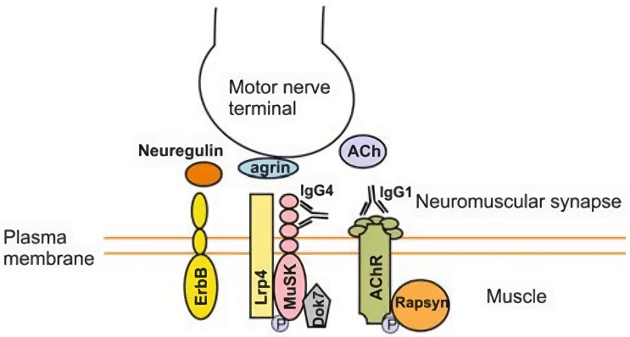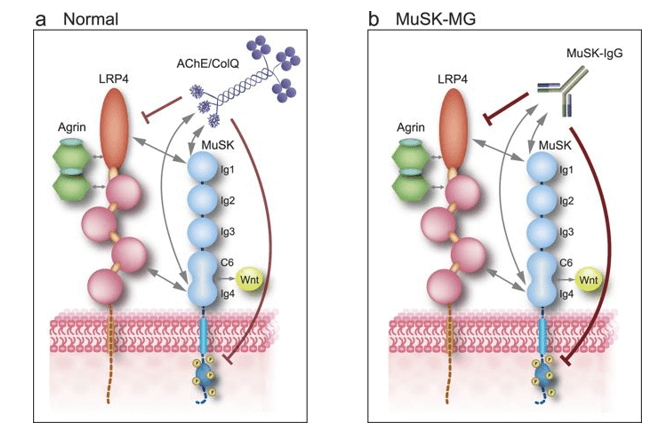NAA Services for Anti-Muscle-specific Tyrosine Kinase (MuSK)
With years of experience and high-end technologies in natural autoantibodies (NAA) research, Creative Biolabs owns lots of scientists who are proficient in disease diagnosis and antibody analysis. With the help of a series of innovative and diversified NAA platforms, our professional scientists are pleased to provide the custom NAA services for our worldwide customers. At present, we are able to provide a comprehensive set of services associated with anti-muscle-specific tyrosine kinase (MuSK) antibody.
Background of Anti-muscle-specific Tyrosine Kinase (MuSK) Antibody
MuSK is a 100kD transmembrane receptor tyrosine kinase which is composed of an N-terminal extracellular domain, a short transmembrane domain and then a C-terminal cytoplasmic domain. MuSK plays a vital role in the development of the neuromuscular junction (NMJ). The synapse begins to form when the axon growth cone of a developing motor neuron encounters a developing myotube and begins to secrete agrin. Agrin then binds to the complex of MuSK and low density lipoprotein receptor-related protein 4 (LRP4), leading to dense clustering of the AChRs in the postsynaptic endplate membrane. Acetylcholinesterase (AChE) binds through its collagen Q (ColQ) tail to perlecan and MuSK. MuSK also participates in agrin-mediated clustering of acetylcholine receptor (AChR) at the endplate. It has been reported that anti-MuSK antibodies mainly belong to the immunoglobulin-G4 (IgG4) subclass, which decrease the clustering of AChR, resulting in abnormalities in electrophysiological NMJ.
 Fig.1 Agrin-MuSK signalling at the neuromuscular synapse.1
Fig.1 Agrin-MuSK signalling at the neuromuscular synapse.1
The Role of Anti-MuSK Antibody in Myasthenia Gravis (MG)
Myasthenia gravis (MG) is an autoimmune neurological disorder disease. Patients with MG are mainly divided into 3 groups, anti-AChR antibody-positive MG (AChR MG), anti-MuSK antibody-positive MG (MuSK MG), and AChR-and MuSK-negative MG (double SNMG). The anti-MuSK antibody is present in 10-70% of all MG patients without anti-AChR antibodies and this MG subtype is clinically more severe than others, with the involvement of facial, bulbar, and upper body muscles, and sometimes with muscle atrophy.
 Fig.2 Schematics of MuSK-LRP4 interaction that is blocked by AChE/ColQ complex and MuSK-IgG. (Otsuka, 2015)
Fig.2 Schematics of MuSK-LRP4 interaction that is blocked by AChE/ColQ complex and MuSK-IgG. (Otsuka, 2015)
What We Can Do about NAA?
Equipped with well-established platforms and experienced scientists, we can provide comprehensive autoantibody analysis services, from NAA detection, NAA profiling, to NAA epitope mapping. A wide spectrum of NAA products is available for your choice.
Features of Our Services
- Advanced technologies and professional scientists
- Fast turnaround time and competitive pricing
- Personalized and comprehensive services to meet every specific demand
- High accuracy and specificity without large scale repeats
Academic findings indicate that monitoring the titer of anti-MuSK antibody can be useful for assessing disease activity as well as decision making during treatment. Creative Biolabs is one of the forward-looking NAA analysis institution and provider who leads the development of the era while offering the best service to the customers around the world. Our seasoned experts in NAA research and development are pleased to provide anti-MuSK antibody analysis services for MG diagnosis. We also provide custom services based on the requirements of the clients to meet the specific demand. Please don’t hesitate to contact us for more information.
References
- Rostedt Punga, Anna. "Chapter Myasthenia Gravis: New Insights into the Effect of MuSK Antibodies and Acetylcholinesterase Inhibitors." (2011).
- Otsuka, Kenji, et al. "Collagen Q and anti-MuSK autoantibody competitively suppress agrin/LRP4/MuSK signaling." Scientific reports 5.1 (2015): 13928.
Related Services:
- NAA Services for Anti-Acetylcholine Receptor (AChR)
- NAA Services for Anti-Lipoprotein-related Protein Receptor 4 (LRP4)
- NAA Services for Anti-Ryanodine Receptor (RyR)
- NAA Services for Anti-Titin Antibody
- NAA Services for Anti-Interferon-α and Interleukin
- NAA Services for Anti-VGKC (Kv1.4)
- NAA Services for Anti-Myofibrillar Proteins

